
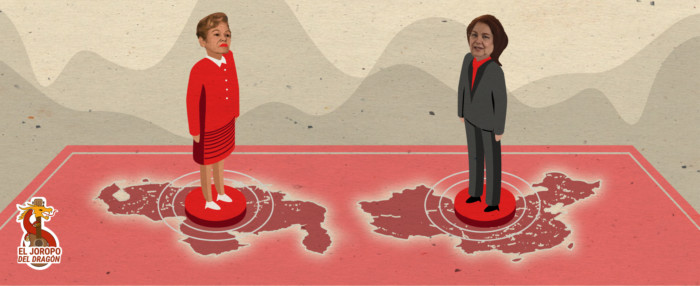
Under Hugo Chávez, two women represented Venezuela in dealings with China to obtain project finance: banker Edmée Betancourt and diplomat Rocío Maneiro. These are their stories.
|
Getting your Trinity Audio player ready...
|
In 2005, Venezuela courted China, which had just arrived in Latin America, and simultaneously launched dozens of projects with money injected by Beijing. The government believed that it would pay back the Chinese loans, backed by the solid oil production at the time. A few years later, the Sino-Venezuelan alliance materialised and, between 2010 and 2013, they negotiated juicy contracts worth many millions of dollars (or yuan, it wasn’t always clear), largely overseen on the Venezuelan side by two women: Edmée Betancourt and Rocío Maneiro.
Both women were committed to the revolutionary cause proclaimed by then President Hugo Chávez. Either out of conviction or because they inherited a historical responsibility, they embraced the strategic ties with China: Betancourt through her presidency of the Venezuelan Development Bank (Bandes), and Maneiro via the Venezuelan Embassy in Beijing.
The strategy left dozens of projects scrapped or half-finished, and showed that Betancourt was no Christine Lagarde, the former head of the International Monetary Fund (IMF) in terms of her financial expertise,, and, in diplomatic terms, Maneiro was no Madeleine Albright, the US secretary of state under Bill Clinton.
What happened between 2010 and 2013 under the watchful eye of these two women was a mess. They may not have caused it, but they witnessed it first hand. It looked as if yuan and petrodollars would rain down for decades and it became easy to talk about the realisation of a mammoth 675 projects worth US$313.4 billion, financed only by the Chinese-Venezuelan Long Term Fund.
Internal communications between Bandes, headed by Betancourt, and the Venezuelan Embassy in China, headed by Maneiro, show that both picked up on their Chinese partners early unease with Venezuela’s informality with respect to the terms of the Chinese Fund's financing contract.
In particular, they expressed discomfort with resources for projects that were contributed by China itself to the Large Volume and Long Term Fund, initiated in 2010. Chinese officials demanded certainty that obligations would be fulfilled and even resisted to continuing with major projects if full payment of the amounts stipulated in the contracts was not guaranteed.
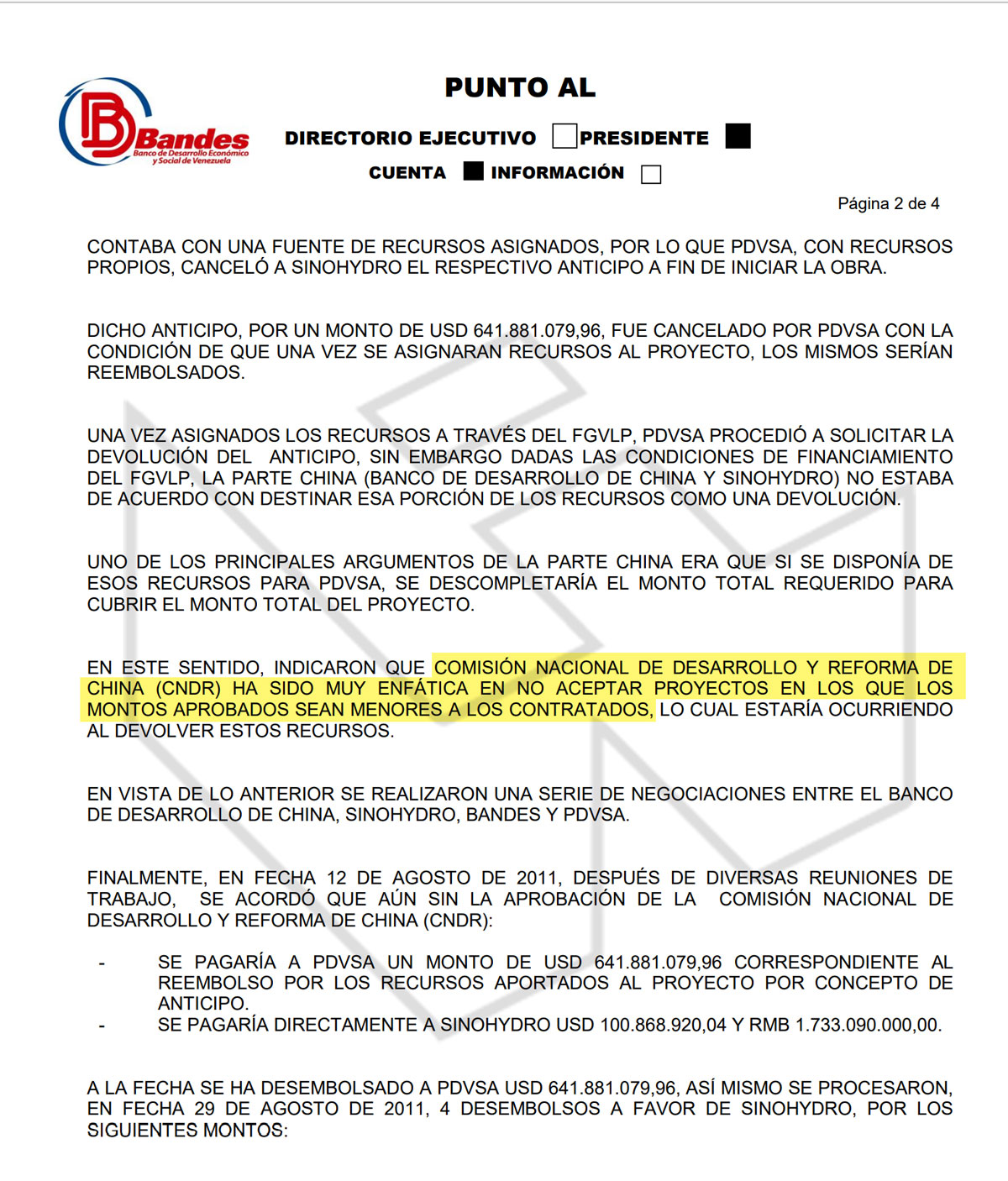
Armando.info has had access to communications between Caracas and Beijing from 2009 to 2012 as the two partners agreed to cooperate on development projects. These documents and others form the foundation of the series Venezuela’s Dance with China. The stories are published in partnership with the Latin American Center for Investigative Journalism (Clip). Diálogo Chino has contributed with additional reporting.
In 2011, Bandes’ Executive Management of Development Funds addressed a communication to Betancourt, its president, informing her that China's National Development and Reform Commission (NDRC), the country’s highest planning body, had been "very emphatic in not accepting projects in which the approved amounts are less than the contracted ones". This was a reference to the 972 MW Phase 1 thermoelectric power plant project jointly executed by Sinohydro and PDVSA, Venezuela’s national oil company.
The high-level meetings were relaxed and friendly. Yet, operations at the management level were confusing. Letters were exchanged with a string of reproaches.
From the outset, the terms of the bilateral fund negotiation were unclear and suggest that behind closed doors the commercial relationship wasn’t entirely marked by mutual trust. The Venezuelans were in a hurry to obtain foreign exchange, while the Chinese were interested in execution and planning.
According to official minutes, over a two-year period the Venezuelan-Chinese Joint Fund held around 600 briefings and almost a hundred operational meetings with the different stakeholders. The lenders were demanding a level of precision that the Venezuelan officials could not provide and Maneiro was entrusted to broker the relationship until Betancourt joined Bandes.
The role of Betancourt, the "Chinese minister", as Commander Hugo Chávez came to call her, was to oversee the finance. Behind her was a complex bureaucratic network whose sway depended on the price of oil and the will of the representatives of the Central Bank of Venezuela (BCV), PDVSA, ministries and banks who attended meetings.
Even Asdrúbal Chávez, the late president's cousin and by then vice-president of Refining, Trade and Supply of the oil company, later to become head of the Ministry of Energy, as well as president of PDVSA, was present. Still, Venezuela relied on Maneiro’s diplomacy in negotiations with the NDRC and China Development Bank (CDB).
The offices of Betancourt and Maneiro were in direct communication. Their exchanges reveal attempts to find a way out of the forthcoming whirlwind they both foresaw. Maneiro alluded to the silences of the then planning minister, Jorge Giordani, who promised high-level meetings with Chinese lenders. Betancourt, for her part, asked the ambassador for "her diligences to solve a matter related to the disbursements" of stalling projects that Venezuela had given a lot of publicity, such as those to develop electricity generation.
The ambassador’s responses were sober and sharp. She requested additional information on what President Chávez had signed, while Chinese partners asked for explanations of the agreed projects. Perhaps in the past Maneiro had enjoyed more direct communication with the revolutionary leader.Yet, in the last years of his life, as Chávez was afflicted by an aggressive cancer, more power was given to third parties who were closing the circle. From what one reads, Maneiro felt as if she was being thrown to the lions and needed an ace up her sleeve to get a deal.
On 19 May 2011, she wrote to Betancourt, underscoring the urgency of her situation: "I explained the reservations of the NDRC on some of the 28 projects and requested the attention of the competent Venezuelan authorities on this situation, in order to avoid difficulties for the disbursement of resources, and therefore, for the development of the projects (...) I consider it extremely important to have, before my meeting on Tuesday 24, some information".
The Chinese had numerous reservations, according to the letters circulated, and they let Maneiro know this. Each day that went by without a response aggravated relations with CDB and NDRC. On some projects, Venezuela remained silent for up to six months. One case, for example, was the contract between CVG Ferrominera Orinoco, the Chinese state-owned Wisco and the Venezuelan subsidiary of the China Railway Engineering Corporation..
"The NDRC requests clarification (...) and suggests that negotiations continue with the aforementioned companies to finalise the contracts and move forward with the execution of the allocated financing funds," wrote Ambassador Maneiro, outlining other cases in which no contract had been signed.
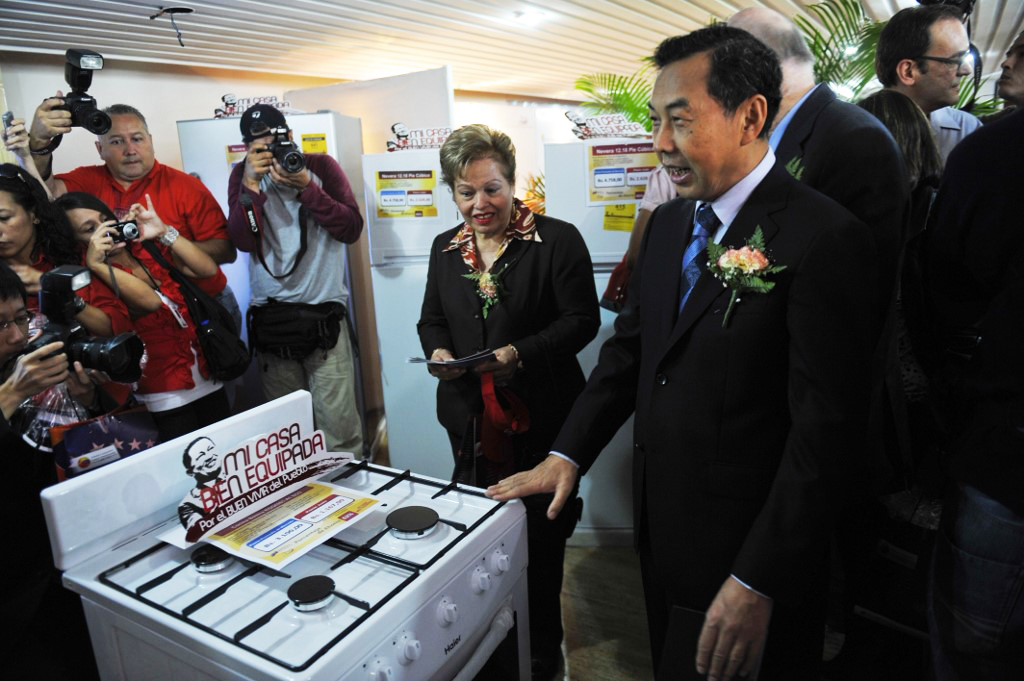
Edmée Betancourt had a relatively low profile in her previous role as trade minister, but she was active and not known for blunders. One day she would be seen inaugurating the Venezuelan Industria Tecnológica (VIT) factory to assemble computers, the next talking about the Empresa Socialista de Pañales (Socialist Diapers Company). In 2003 she was deputy Minister of Industry, and twice at the head of the Cinistry of Commerce, in 2005 and 2011.
Before that, the engineer born in Valencia, in the north of the country, had been a professor at the University of Carabobo. It was there that she became friends with the lawyer Blancanieves Portocarrero, who was Minister of Labour. In 2002, Betancourt was invited to join the executive branch. Both were linked to the left-wing political movement that upheld the ideals of the self-styled Bolivarian Revolution and they were noticed by its leader.
When Betancourt took the reins of Bandes on the first day of January 2010, she did so with an existing team. She arrived at the bank with little time to soak up all the tax and legal reforms that had been made in Venezuela; much less to adapt them to China’s. Executive reports on the different negotiations, administrative practices, customs procedures, legal nooks and crannies, and the latest deadlines passed through her office. She acted as a hinge between various institutions and economic powers, including the team of then planning minister Giordani, who was a mentor and close Chávez ally.
Neither Edmée Betancourt thought of going into trade and finance, nor Rocío Maneiro into diplomacy, but it was the task that chavismo assigned them. The women entered a circle of trust and managed trade relations between China and that had few controls or audits.
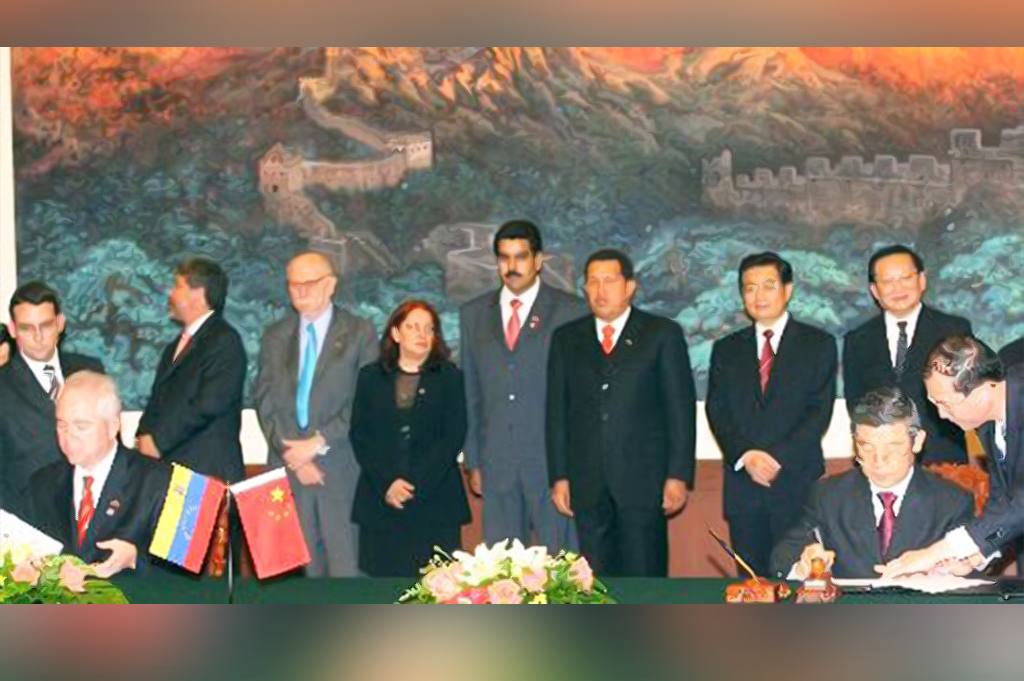
The documents that passed through Edmeé Betancourt's hands as president of Bandes concluded with recommendations condensed in two sentences. Under Betancourt, the bank's executive manager of Finance and Fund Administration was María de los Ángeles González, who authored numerous account items. González was later arrested in 2013 in the US after confessing to illicit handling of public debt bonds during her time at Bandes. She was sentenced to prison. She has already served her sentence.
But while this became known between 2010 and 2012 during Betancourt's years at the bank, the exchanges with China carried on. Many technical documents relating to the binational fund's projects were designed and exchanged but they did not cover all the loopholes and unforeseen events that arose from the novelty of working variously in US dollars, renminbis and bolivars.
An example of the confusion this generated in Bandes was when requirements arose that had to be met "with haste", such as the withholding of taxes related to disbursements from the Large Volume and Long-Term Financing fund. On 26 September 2011, when several projects were underway, Betancourt asked CDB to "activate a financial mechanism" that would enable compliance with tax regulations, calculating taxes in advance to be deposited in accounts that Bandes would "open" in the Chinese bank’s Hong Kong office.
On 8 April 2011, Ambassador Maneiro warned former minister Giordani of concerns expressed by Zhang Ping, then chairman of the board of directors of the NDRC, and of the Chinese chapter of the China-Venezuela High-Level Joint Commission. He cited, for example, "the slow progress in negotiations". He also spoke of "the lack of coordination and accurate information" that prevented the two partners from being on the same page, "especially when it comes to amounts in financial resources that do not correspond to those established in the contracts signed".
When Nicolás Maduro assumed the presidency in 2013, the Chinese ladies were about to become septuagenarians. Yet despite their years in public life, almost nothing is known about them, apart from the fact that Edmée Betancourt is the mother of two children and that Rocío Maneiro has three.
In 2013, Betancourt was assigned new duties as president of the Central Bank of Venezuela (BCV) but she would never again enjoy the privileges she was accustomed to under Chávez’s successor and Maduro soon fired her. She was never seen on television again.
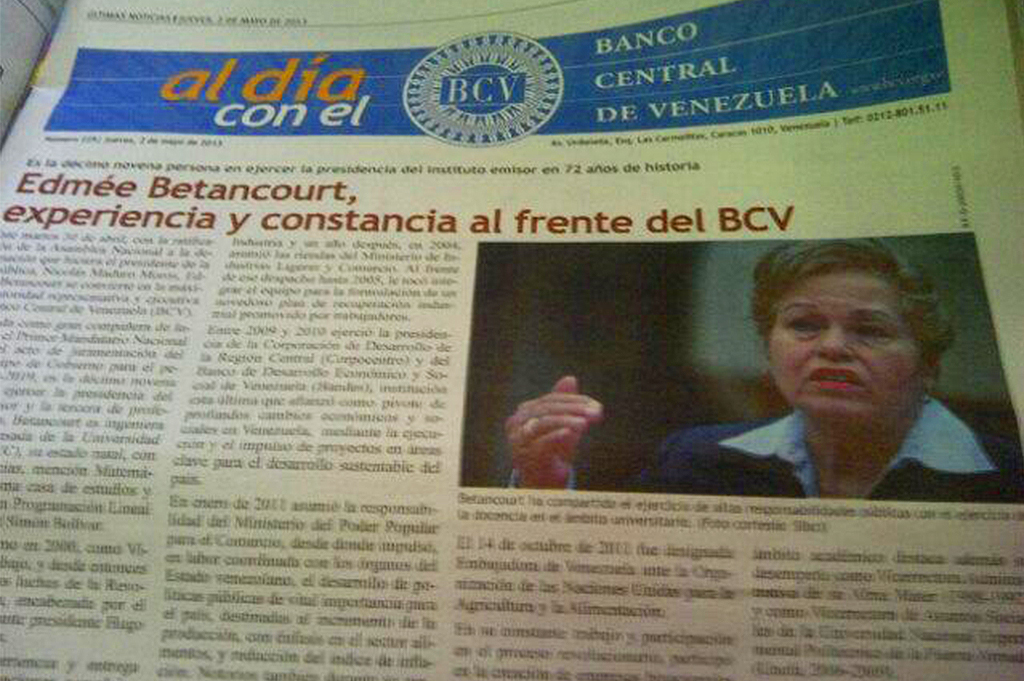
Betancourt committed a cardinal sin of chavismo in speaking of corruption within Venezuela's financial establishment. "What was delivered in foreign currency last year (2012) were very considerable amounts, but there is also another considerable amount of foreign currency that was taken to briefcase companies (...) Between US$15 and 20 billion were passed on," she said at a press conference still remembered by the journalists present.
Noises got too loud and within 24 hours Maduro ostracised her. She suffered the same fate as Monk Giordani, another Chávez made corruption allegations in foreign currency allocations. . Both were forgotten.
Maneiro continued as ambassador to China and then to South Korea until the end of 2013, when President Maduro himself requested the change for personal reasons.
"She has done an extraordinary job, a woman of great loyalty to Commander Hugo Chávez, to our Venezuelan homeland, she has been a builder in these ten years of service in China of these historic relations," the Venezuelan president said of the ambassador, who has became an important figurehead in the history of relations with China.
His brother, Alfredo Maneiro, a notable figure of the Venezuelan left, had also visited Beijing several times, albeit decades ago. He was in Mao's China in 1959, when he was a young leader of the Communist Party of Venezuela (PCV), and in 1962 when he was Comandante Tomás of the Manuel Ponte Rodríguez front of the Armed Forces of National Liberation (FALN), a Venezuelan guerrilla group of the time.
The ideas of this neo-Marxist philosopher -founder and thinking head, later, of La Causa R party, until his premature death in 1982, when he was not yet 50 years old- were an ingredient in Hugo Chávez's ideological lasagna, and it seems that they too for Nicolás Maduro's. The presidential speeches of both have been full of direct quotes from Maneiro or ideas clearly inspired by him.
Unlike Betancourt, Ambassador Maneiro did not leave through the back door. In June 2014, before resuming her diplomatic duties, she was awarded the Orden Libertadores y Libertadoras de Venezuela Primera Clase Espada for "her outstanding service to the homeland, which has contributed to the re-foundation of the Venezuelan nation".
Shortly afterwards, she was transferred to a modest office in the Venezuelan embassy in London.As Venezuela’s various economic and political crises deepened, staff at the embassy complained that they were not being paid. Some even saying they had gone months without pay.
Maneiro, however, was not having such a bad time and admitted to having spent "a luxury holiday" in Paris when she testified at a recent court hearing.
Faced with the complaints of late payments to embassy staff, Maneiro alleged that "neither the Embassy nor the ambassador have anything to do with the allocation and administration of the resources of the Venezuelan pavilion in Shanghai," according to a statement that was published at the time. She was referring to an old controversy with former Vice Foreign Minister Temir Porras regarding the Venezuelan participation in the Shanghai World Expo in 2010. Porras had centralized all the contracting and allocation of funds for the event in the commercial and financial capital of mainland China, leaving Maneiro aside; then a report by Maneiro on alleged administrative irregularities by Porras would emerge. Both Maneiro and Porras then worked for the Ministry of Foreign Affairs when the Chancellor was the current president, Nicolás Maduro.
Maneiro’s standing did deteriorate in early 2019, however, when Juan Guaidó declared himself the president of Venezuela. UK prime minister Boris Johnson followed the US and EU in recognising Guaidó as the legitimate leader of Venezuela and Maneiro was stranded, replaced in the UK’s eyes by Guaidó appointee Vanessa Neumann, a Venezuelan-American diplomat and businesswoman.
Corruption scandals also splashed Maneiro. Spanish newspaper El País published an investigative report claiming that Maneiro had hidden US$4 million in the Banca Privada de Andorra, a collapsed and obscured bank in that tax haven. The report said she had moved capital between four accounts of "instrumental companies" created in Panama by the same bank.
The large sum was registered with the bank as the result of an "international business consultancy", whose operations coincided with the diplomatic tenure of her in China from 2012 onwards. The Andorran Financial Intelligence Unit claimed, according to the Spanish media, that "the funds have their origin in corruption in Venezuela". Maneiro testified before a judge in the principality that the money was the product of "the sale of the rights of an inheritance in Venezuela".
The money ended up in the Swiss and US account of one of Maneiro’s three sons. The Financial Intelligence Unit that worked on the case said the intention was to deposit US$10 million dollars in one of his accounts: "It is about payments from Chinese companies through Diego Salazar to high-ranking Venezuelan officials in exchange for the concession of the construction of different infrastructures in the Venezuelan energy sector", the investigation concluded.
Little is known about the heritage of the Venezuelan diplomat. She has not proven that this fortune comes from the side of the Maneiro González family. Nor does it seem likely that it is another legacy left by her brother Alfredo Maneiro, who never held official positions, who as a trade unionist had an intense and notably public political life, and when he died he was a professor at the Central University of Venezuela (UCV).
The surname of the paternal family is connected with two heroes of the Independence, Manuel and José Joaquín Maneiro, who were from the island of Margarita, in the east of the country. Rocío was the only woman of four brothers and the youngest in the house. Her parents were married on February 14, 1922 in the central parish of Altagracia, in Caracas.
Even if she wanted to forget excerpts from his life, the history and the Bolivarian revolution have been in charge of documenting all possible aspects of Alfredo Maneiro. Even his brother's thesis on Philosophy at UCV is in the Central Library, but there is no indication of the professional career she pursued.
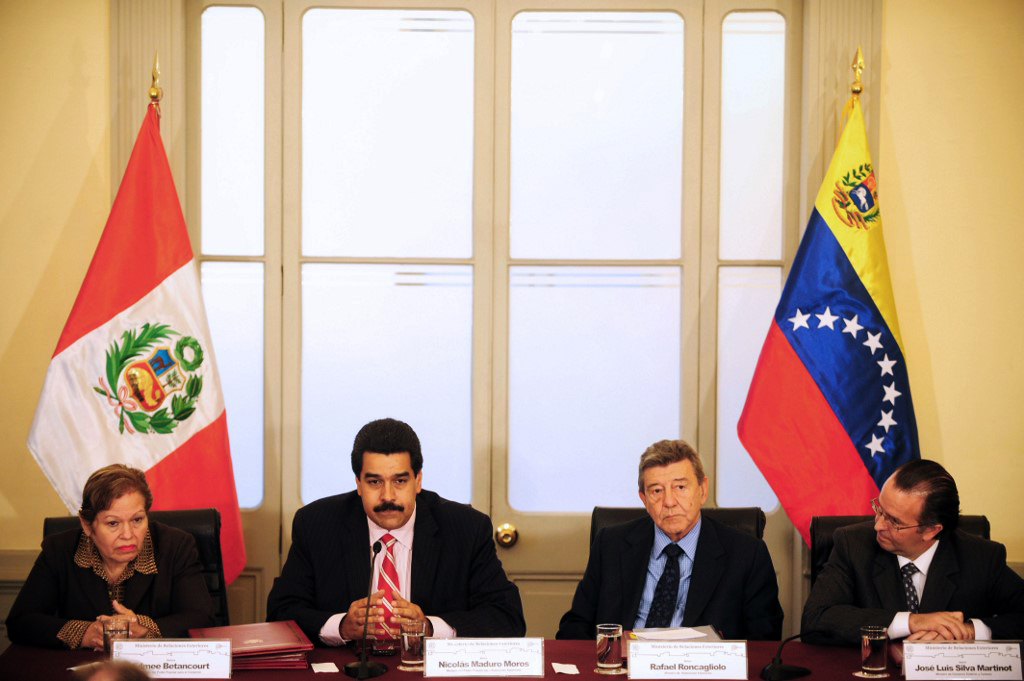
Edmée Betancourt earned Hugo Chávez's trust. At the comandante's side, she would let go of her characteristic sobriety and let herself be embraced by him.
Chávez's protection of Betancourt lasted as long as his life. When Maduro became president, Betancourt was discarded. She served as a convenient scapegoat for one of Maduro's many U-turns. Although those close to her admit that she has since been asked to return to the ranks of the revolution, she decided to keep a low profile at home in her native Valencia, 'close to her grandchildren'.
Maneiro remains in the UK as Maduro’s representative. Her recent travails includedher host country refusing to recognise Maduro's authority to handle the US$1.1 billion in gold stored at the Bank of England.
The “Chinese ladies” obeyed both the governmental and financial rules of the game, entrusted with key roles in Venezuela’s growing indebtedness to China.
During Chávez's second presidency, Betancourt and Maneiro were experts on China. There was only one option : socialist homeland or nothing. They were strategists and bureaucratic operators, who manoeuvred according to the decisions "from above". Both women stood out as authorities on the future of bilateral cooperation; they were the visible faces of the deals worth many billions of dollars - or yuan. They took on the sometimes unenviable responsibilities that the revolution assigned them.
When Vice President Delcy Rodríguez turned to a group of Mexican friends and partners to lessen the new electricity emergency in Venezuela, she laid the foundation stone of a shortcut through which Chavismo and its commercial allies have dodged the sanctions imposed by Washington on PDVSA’s exports of crude oil. Since then, with Alex Saab, Joaquín Leal and Alessandro Bazzoni as key figures, the circuit has spread to some thirty countries to trade other Venezuelan commodities. This is part of the revelations of this joint investigative series between the newspaper El País and Armando.info, developed from a leak of thousands of documents.
Leaked documents on Libre Abordo and the rest of the shady network that Joaquín Leal managed from Mexico, with tentacles reaching 30 countries, ―aimed to trade PDVSA crude oil and other raw materials that the Caracas regime needed to place in international markets in spite of the sanctions― show that the businessman claimed to have the approval of the Mexican government and supplies from Segalmex, an official entity. Beyond this smoking gun, there is evidence that Leal had privileged access to the vice foreign minister for Latin America and the Caribbean, Maximiliano Reyes.
The business structure that Alex Saab had registered in Turkey—revealed in 2018 in an article by Armando.info—was merely a false start for his plans to export Venezuelan coal. Almost simultaneously, the Colombian merchant made contact with his Mexican counterpart, Joaquín Leal, to plot a network that would not only market crude oil from Venezuelan state oil company PDVSA, as part of a maneuver to bypass the sanctions imposed by Washington, but would also take charge of a scheme to export coal from the mines of Zulia, in western Venezuela. The dirty play allowed that thousands of tons, valued in millions of dollars, ended up in ports in Mexico and Central America.
As part of their business network based in Mexico, with one foot in Dubai, the two traders devised a way to replace the operation of the large international credit card franchises if they were to abandon the Venezuelan market because of Washington’s sanctions. The developed electronic payment system, “Paquete Alcance,” aimed to get hundreds of millions of dollars in remittances sent by expatriates and use them to finance purchases at CLAP stores.
Scions of different lineages of tycoons in Venezuela, Francisco D’Agostino and Eduardo Cisneros are non-blood relatives. They were also partners for a short time in Elemento Oil & Gas Ltd, a Malta-based company, over which the young Cisneros eventually took full ownership. Elemento was a protagonist in the secret network of Venezuelan crude oil marketing that Joaquín Leal activated from Mexico. However, when it came to imposing sanctions, Washington penalized D’Agostino only… Why?
Through a company registered in Mexico – Consorcio Panamericano de Exportación – with no known trajectory or experience, Joaquín Leal made a daring proposal to the Venezuelan Guyana Corporation to “reactivate” the aluminum industry, paralyzed after March 2019 blackout. The business proposed to pay the power supply of state-owned companies in exchange for payment-in-kind with the metal.